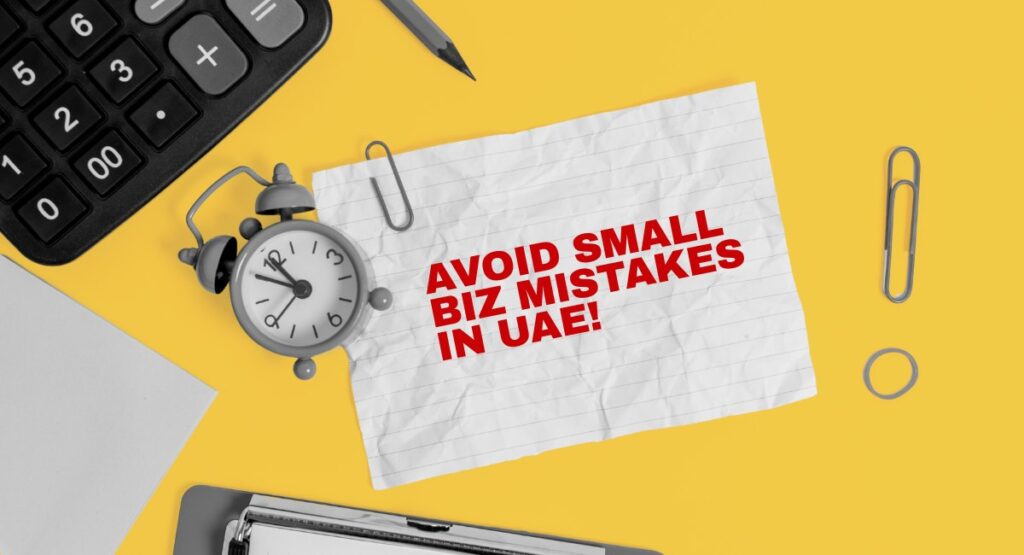Accounting Mistakes Small Businesses Make in the UAE (And How to Avoid Them)

Starting a small business setup in the UAE, whether in the mainland or a free zone is exciting. There’s real potential here. But if you mess up your accounting? You’re opening the door to a whole bunch of avoidable problems, think cash flow chaos, FTA fines, and corporate tax trouble.
So let’s unpack the common slip-ups small businesses tend to make and how you can avoid them without losing your mind.
Table of Contents
Toggle1. Mixing Personal and Business Money
This one’s a classic. You pay for inventory using your personal card. Or maybe you cover your lunch meetings from the business account and forget to log it. Before you know it, everything’s tangled.
Come audit time, you’re staring at a mess that’s almost impossible to explain.
What to do instead:
- Open a separate business bank account and a credit card just for the company. No mixing.
- Stick to it, use them only for business stuff.
- Keep a proper chart of accounts so every dirham gets tracked neatly.
That kind of clean separation makes life easier for your accountant, your tax consultant, and honestly, your future self.
2. Sloppy or Missing Records
Let’s be real, record-keeping isn’t fun. But ignoring it is a fast track to bad decisions and big fines. Whether it’s lost receipts, lazy data entry, or just forgetting to log expenses, it all adds up.

And the FTA? They’re not big fans of “oops.”
Here’s how to stay on top of it:
- Use cloud-based accounting tools like Zoho Books, QuickBooks, Xero, or Tally Prime, whichever fits your business setup needs best.
- Make it a weekly habit: log expenses, scan receipts, reconcile.
- VAT records must be kept for at least 5 years, and corporate tax-related records for a minimum of 7 years from the end of the relevant tax period.
Organized books won’t just help you sleep better. Proper records are essential for audits and, in some industries, for ICV (In-Country Value) certification, especially if you’re bidding for government contracts.
3. Not Taking VAT Seriously
Many small businesses wait too long to register for VAT or don’t fully understand the thresholds. If your annual revenue hits AED 375,000, VAT registration is mandatory. Businesses earning more than AED 187,500 can register voluntarily. Also, if you’re a non-resident making taxable supplies in the UAE (even without a fixed place of business), you must register, regardless of your revenue. And that decision can come back to haunt or help you.
Missing a filing will trigger a penalty, and repeated late filings can lead to doubled fines and additional interest
Here’s what you need to do:
- Register once you hit the revenue threshold or sooner, if it makes strategic sense.
- Automate VAT calculations, rate tagging, reverse charge, tax points, the whole thing.
- Don’t trust memory. Set reminders. Triple-check every return.
- Work with a VAT consultant or tax advisor. It’s worth it.
4. Ignoring Bank Reconciliation

Think of skipping reconciliations like driving with your eyes closed. You won’t know if a transaction went missing, if someone made an error or worse, if there’s fraud happening.
So here’s your move:
- Reconcile your bank and credit card accounts at least once a month.
- Use software with auto-imported bank feeds. Saves time.
- Fix discrepancies immediately, don’t let them pile up.
If you’re in a cash-heavy business like retail or trading, this isn’t optional. It’s protection.
5. Misclassifying Income or Expenses
Maybe you booked a personal dinner as a business meeting. Or forgot that a certain service you offer is VAT-exempt. These aren’t harmless mistakes, they can completely throw off your finances.
How to avoid this:
- Stick to a chart of accounts that follows UAE accounting standards.
- Make sure your staff or whoever is handling the books knows what goes where.
- Review everything regularly. Fix errors fast.
Accurate records are crucial, especially if you’re a Free Zone business aiming to qualify as a ‘Qualifying Free Zone Person’ (QFZP), as incorrect classifications could disqualify you from QFZP benefits.
6. No Grip on Cash Flow
You might be making a profit, but still run out of cash. Happens more often than you’d think. Salaries, rent, customs charges, VAT payments, they don’t wait for your next invoice to clear.
Stay ahead with these habits:
- Track cash in and out every week. Seriously, weekly.
- Create a 12-month cash flow forecast. Base it on sales patterns and major expenses.
- Keep VAT and corporate tax in a separate account. Don’t touch it for anything else. Just a heads-up: Corporate Tax returns must be filed within 9 months from the end of the relevant tax period, as per FTA regulations.
Cash flow isn’t just numbers on a spreadsheet. It’s the fuel that keeps your business moving.
7. Forgetting Depreciation and Accruals
If you’re only looking at cash in and cash out, you’re missing a huge piece of the picture. Assets lose value. Bills pile up before they’re due. Without tracking depreciation or accruals, your financials won’t show the full story.
Here’s the fix:
- If your revenue exceeds AED 3 million annually, UAE Corporate Tax law requires you to follow International Financial Reporting Standards (IFRS) for your financial statements.
- Hire someone who understands non-cash accounting—depreciation, prepaid expenses, matching costs to the right period.
- Don’t leave updates until the end of the year. If your revenue is below AED 3 million, you may qualify for Small Business Relief, which reduces Corporate Tax burdens, but it’s still smart to maintain clean finances year-round.
This is what serious investors and banks look for when evaluating your business.
8. Doing Everything Yourself

Accounting might seem simple when you’re just starting. A few transactions, some invoices. But then come the tax filings, VAT adjustments, payroll, audits…
But once the returns, audits, and payroll start piling up, DIY turns into a ticking time bomb.
Here’s what works better:
- Hire a bookkeeper or accountant early, and don’t have to be full-time.
- Outsource corporate tax, VAT, and accounting support to professionals.
- Consider hybrid solutions: software plus a trusted consultant who checks in regularly.
Spending a little on the right help can save you from much bigger costs and stress later on.
Why All This Matters
Whether you’re running an online store, a small consultancy, or a trading company in the UAE, the rules aren’t just “suggestions.” Tax authorities expect everything: clean books, timely filings, accurate data, and proof to back it up.
Neglecting any of these areas can slow your license renewals, damage your credibility with banks, or even cost you Free Zone benefits. Worst case? You’re stuck in penalty mode while trying to shut down or restructure your business.
Quick Reference Table
| Mistake | Risk / Consequence | Smart Fix |
| Mixing finances | VAT errors, failed audits | Use separate accounts & cards |
| Bad record-keeping | Missed receipts, late filings | Go paperless; keep records for 5–7 years |
| VAT mistakes | Fines, delayed returns | Register early, automate, get help |
| No bank reconciliation | Fraud, hidden errors | Reconcile monthly using software |
| Misclassified data | Skewed financials | Use correct codes; review often |
| Weak cash flow | Missed payments | Forecast cash needs; reserve tax funds |
| Skipping depreciation | Misleading profits | Record non-cash items accurately |
| DIY approach | Costly penalties | Bring in professionals early |
Final Thoughts
Accounting doesn’t have to be your favorite part of the job, but neglecting it is like ignoring a critical warning sign in your business. You might manage in the short term, but the problems will compound and could result in serious financial consequences. Build strong habits now, and you’ll thank yourself when the audits, renewals, and tax filings hit. You can drive with it on… but don’t be surprised if you end up on the side of the road.
Build good habits early. Separate your finances. Use solid tools. Reconcile regularly. Keep your cash flow tight. And if you’re not sure about something, get help.
Because in the UAE, the stakes are high, but with the right support, the rewards are even higher.
Disclaimer:
The information provided in this article is for general guidance only and is not intended to serve as legal, tax, or accounting advice. Laws and regulations in the UAE may change, and how they apply to your specific business may vary. For personalized advice, always consult a licensed tax advisor or accounting professional in the UAE.
Sources:
- UAE Federal Tax Authority (tax.gov.ae)
- PwC UAE Tax Summaries
- Zoho VAT UAE Guide
- Capstone Accountants Blog
- Taxually
FAQ
1. How can small business owners avoid bookkeeping errors?
Start with the basics: separate your personal and business accounts, no exceptions. Then, use reliable accounting software like Zoho Books, QuickBooks, or Xero to automate the grunt work. Build a weekly routine: log expenses, scan receipts, and reconcile everything. And don’t wait till year-end, check your reports monthly. The cleaner your books, the fewer surprises.
2. What happens if I mix personal and business finances?
A lot of headaches. When audit season rolls around, it becomes nearly impossible to explain which transaction was for business and which wasn’t. That can trigger VAT issues, tax filing errors, or even fines. Avoid the mess, use a dedicated business bank account and credit card from day one. It keeps everything clean and trackable.
3. What are the most common bookkeeping mistakes that business owners make?
The biggest culprits?
– Mixing personal and business funds
– Ignoring receipts and expense logging
– Missing VAT deadlines
– Not reconciling bank accounts
– Misclassifying income and expenses
– Skipping depreciation or accruals
– Trying to handle everything alone
Each one of these can cost you either in time, money, or credibility. The fix? Solid systems, regular reviews, and a little help from professionals when you need it.
4. Do I need an accountant or can I handle my books myself?
You can do it yourself in the beginning, especially if things are simple. But once VAT, corporate tax, payroll, or audits come into play, DIY turns risky fast. A part-time accountant or outsourced support can save you from costly mistakes down the line. Hybrid setups (software + consultant) are great for small businesses on a budget, and help you avoid costly mistakes, missed filings, and potential penalties.
5. Can poor accounting really affect small business growth?
Absolutely. Messy books can delay your license renewal, block bank loans, ruin your cash flow, or trigger tax penalties. Even worse? You could lose your Free Zone tax benefits or misread whether your business is actually profitable. Good accounting isn’t just for compliance, it’s how you make smart decisions and scale without chaos.
